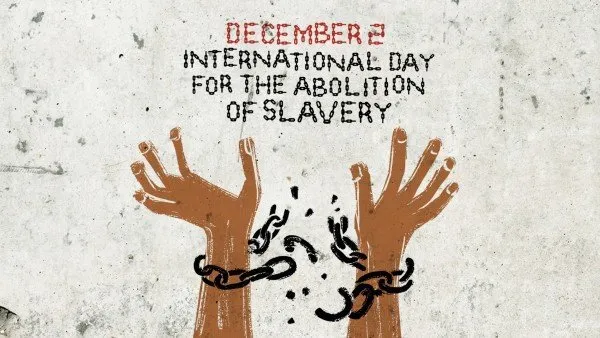By Valia Nikolaidou,
Marking on our calendars today (December 2nd) is one of the most important international days whose purpose is, sadly, still relevant and existing in all countries around the world; it is of course the International Day for the Abolition of Slavery.
Adopted by the General Assembly of the United Nations (i.e. the leading policy-making compartment of the organization), it was first celebrated 73 years ago, on December 2nd, 1949, with ambitions to eliminate contemporary slavery in all its forms as in (sexual) trafficking, child labor in unhealthy work environments and war zones as well as forced marriages. With the arrival of the COVID-19 pandemic, the dangerously ever-present climate change crisis, and, of course, the ongoing recess, a lot of people have been inadvertently driven to become one way or another dependent on slavery jobs.
More specifically, according to statistics conducted by UNICEF’s various surveys, nowadays at least 80 million children from ages 5 to 17 years old are working in perilous environments for even more intensive hours in the day, due to schools closing down because of the pandemic. Another vulnerable social group that can be easily dragged into this cruel situation is women. One in every 130 women is somehow entangled in a modern form of slavery.

We might think that these horrendous events are happening in some countries far far away from our own but in reality, the problem is global and affects at least 40 million people worldwide. In all probability, there are people that we stumble upon every day on the street or even someone from our immediate environment who could be a potential victim of slavery. Let us take a look at the most prevalent forms:
- Human trafficking, mostly known for sexually exploiting its victims, is when a person is enslaved into providing services either of a sexual nature, manual work, felonious activity, or in some extreme cases, the selling of their own inner organs.
- Forced labor in hostile environments, usually with little or nonexistent payment with the threat of harsh punishment lingering in the background.
- “Debt bondage”: A term about people with an uncontrollable amount of debts who are working relentlessly for ruthless usurpers and their fragile economic situation is being taken advantage of.
- Child slavery: Children are the easiest “workers” to manipulate, with humiliating payments and long working hours. According to The Worst Forms of Child Labor Convention (No. 182) endorsed in 1999 and becoming effective in 2000 by the International Labor Organization, the major slavery practices are as workers in unsanitary institutions, as warriors in warzones, as prostitutes, or as drug traffickers.
- Forced and illegal marriages, usually when children are forced to get married to full-grown adults.
- Lineage-based slavery: An older type of slavery where people are born into it and are considered “belongings” of someone that took advantage of their ancestors.
- Domestic enslavement: A different kind of slavery where domestic workers are extremely prone to financial exploitation as well as abuse inside their working environment.

Informing and educating ourselves on this serious topic and speaking out about it is very important. Change in a society comes from the rising of voices, firstly of the privileged people who are not in this unbearable position, and then of the victims themselves. The biggest humanitarian organizations, governments all around the world, and every person individually should strive to abolish once and for all this horrendous practice. Let us use this day to reflect on how our personal actions can change the world!
References
- Slavery Abolition Day. un.org. Available here
- International Day for the Abolition of Slavery. ohchr.org. Available here
- Modern Slavery. antislavery.org. Available here




